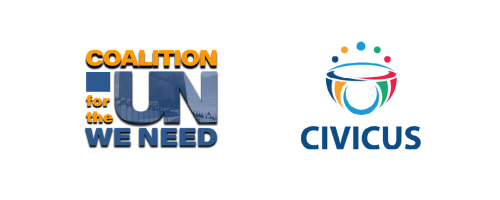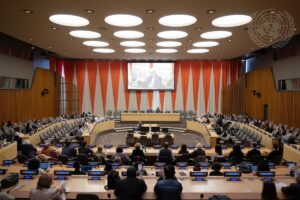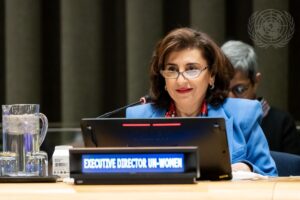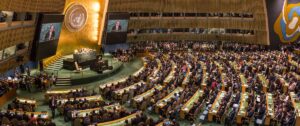
On May 12, 2021, a consortium of independent civil society organizations took part in the sixth roundtable of the “Fulfilling the UN75 Declaration Expert Series,” where thought leaders from global civil society engaged UN Missions and Secretariat officials in a candid dialogue on progress, challenges, and further measures needed to meet two of the twelve commitments presented in the UN75 Declaration. This discussion, sponsored by the Coalition for the UN We Need, CIVICUS and the Stimson Center, in association with the Elders, addressed the UN75 Declaration commitments #8 on “We will upgrade the UN” and #9 on “We will ensure sustainable financing.”
The series is intended to take stock of progress toward achieving the twelve UN75 Declaration commitments, introduce alternative institutional, policy, and normative measures for improving implementation, and consider steps for achieving such reforms, including a possible follow-on intergovernmental process as recommended in the Eminent Persons Open Letter signed by 49 former world leaders and UN officials. The expert series aims to contribute insights and concrete proposals for consideration in the Secretary-General’s forthcoming (Our Common Agenda) report—expected to be released by September 2021, prior to the UN General Assembly (UNGA) High-Level Week.1The opinions, assessments, valuations, positions and, where applicable, judgements expressed are within the responsibility of the authors or the individual persons making the corresponding statements in this publication, which aims to capture and distill, while employing the Chatham House Rule, the ideas conveyed by the 12 May 2021 expert roundtable participants. They do not necessarily and not in every case correspond to the positions and opinions of the event co-sponsors and all participants.
The roundtable’s lead-off speakers included: His Excellency Lakhdar Brahimi, former Algerian Foreign Minister and UN Special Envoy to Syria; Lysa John, Secretary General, CIVICUS; Tetet Nera-Lauron, Advisor for Rosa Luxemburg Stiftung; Richard Ponzio, Senior Fellow and Director, Global Governance, Justice and Security Program, Stimson Center; and (moderator) Jeffery Huffines, Senior Advisor, Coalition for the UN We Need.
Key Lead-Off Speaker Quotes
“From Syria to Yemen, and from Myanmar to Palestine, the tragic human consequences can be measured in the millions of people who have been uprooted from their homes and have lost their lives as a result of violence and instability. […] As long as individual [Security] Council members continue to prioritize unilateralism and narrow national interests over peace, security, and protection of civilian populations, this is, sadly, unlikely to significantly change.” – H.E. Lakhdar Brahimi
“Civil Society must continue to be a part of and engaged with all of the follow-up actions from the UN75 Declaration. The momentum that was built last year should not be dropped this year, and we should continue to be part of building forward on these commitments. We support the new international civil society statement on inclusive global governance and the recommendations it includes for a more democratic UN.” – Lysa John
“We can say that the inequality virus is mutating. How on Earth … is it possible that the super-rich elite continue to amass wealth, while billions suffer and struggle to make ends meet? The wealth surge of the world’s richest people shows the brokenness of the world’s economic and financial systems. If there is … political will to achieve sustainable financing, the key here is to democratize global economic governance.” – Tetet Nera-Lauron
UN75 Declaration Commitment #8 – We will upgrade the UN
Major Points Voiced by Participants
- The agendas and ambitions pushed forward by powerful countries (which exert high levels of influence on the sitting Secretaries-General) can overshadow efforts to tackle inequality, gender equality, and encourage greater representation of civil society and youth (particularly from the Global South) at the UN.
- Geopolitical divisions, unilateral action, and narrow national interests have been magnified in the Security Council, which, in recent years, has failed more than succeeded to take effective action on many of the most pressing peace and security issues on its agenda. Practical constraints must be applied to the disproportionate power and influence of the five Permanent Members (P5) of the UN Security Council (UNSC) within the system.
- Delegations deter ambitious change, shying away from controversial topics, and ultimately hindering major structural reforms. At the practical level, bureaucratic processes and the intergovernmental nature of negotiations can have a detrimental effect on the quality and speed of change. For example, changing the date or name of a formal meeting can take months of consultations and diminish possibilities for major transformation or reform.
- There is a perpetual disconnect between the silo approaches and the need for a just and transformative recovery. Apart from smaller-scale programmatic, operational, and institutional fixes, business continues as usual and conditions for change are lacking at the UN. Change to current structures will only start through increased trust among Member States and strengthening the UN as a source of hope for the present, but even more, for the younger generations.
- We need new types of moments, such as the signing of the UN Charter in San Francisco and the Bandung Conference, to instill hope and revitalize the spirit of multilateralism.
- Achieving a consensus of all Member States in as many decisions as possible is harmful and hinders progress.
Major Recommendations: Policy, institutional, legal, normative, and operational reforms
- Limiting future UN Secretaries-General to a single six- to seven-year term in office would decrease the level of political influence to which they are often subject to and would allow them to focus more on the institution’s performance and accomplishments.
- Serious political will must be initiated by the P5 to establish a more collaborative approach to the Security Council’s decision-making processes.
- The Council needs to be reformed to be more accountable for its actions and in line with modern standards of governance legitimacy. There should be fundamental changes to its membership and governance structure. Increasing the number of Member States in the non-permanent category would allow for better representation of the world in the Council; it would represent a first step forward in enhancing the Council’s legitimacy.
- The UNSC could be organized in a similar way to existing governance structures, such as the World Bank or International Monetary Fund (IMF), to always ensure more broad-based country representation. Given that one of the main challenges to UNSC reform is the veto power, voting structures within the Council could reflect political and economic realities, allowing for different voting power levels but fundamentally removing the veto power. This would promote equitable power distribution and facilitate structural changes within the UN system.
- Revamping the UN General Assembly agenda-setting process would allow for key issues and resolutions to be addressed without repetition. An Interest of Preposition can serve as a system for trying out potential agenda items that can be better prioritized over the long-term (two-to-three years) rather than annually.
- Through the six UNGA Committees, Member States should have more opportunities for real debates and interactive dialogues on key aspects of the Committees’ work, instead of reading prepared statements.
- For a networked and inclusive multilateralism, the coordination function of the UN Economic and Social Council and the political leadership generated through the annual UN High-level Political Forum on Sustainable Development should be enhanced. Both UN entities have great potential to serve as network nodes, fostering policy coherence, and engaging non-governmental partners in the UN’s work.
- Mechanisms and bodies such as a World Citizens’ Initiative, a UN Parliamentary Assembly, and a high-level office of a UN Civil Society Envoy, as outlined in the international civil society statement on inclusive global governance, should be implemented to allow for better participation and representation of citizens and civil society, which, in turn, would promote accountability through greater oversight of UN Member States’ engagement at the UN and the work of the Secretariat, and assist in driving overall UN revitalization efforts.
UN75 Declaration Commitment #9 – We will ensure sustainable financing
Major Points Voiced by Participants
- The makeup of the UN’s revenue system presents several challenges that undermine the UN’s ability to ensure sustainable financing for its operations, making it prone to liquidity crises. Powerful Member States have an outsized influence over the UN’s operating budget, and the increased use of earmarked contributions contributes to fragmentation and accountability issues across the system.
- Recent events have also shown weaknesses in the WHO’s ability to act due to its heavy reliance on private financing. There should be a move away from such heavy and insufficiently qualified reliance on private and voluntary financing towards greater assessed government financing for vital UN organs, without prejudice to the possibility of fully transparent, no-strings-attached private funding in certain contexts.
- Leading Member State contributors to the UN budget may not be as invested in the organization as the founding generation was in the mid-1940s. There must be an effort to revitalize interest in the UN’s success among current national leaders.
- Sustainable financing is also integral to accelerating the implementation of the Sustainable Development Goals, supporting equitable access to vaccines, providing integrated responses through the Peacebuilding Fund, and ensuring the critical resources needed to fund the UN budget and peacekeeping. Shortfalls, payments in arrears, and financing gaps directly impede all of these efforts and the overall effectiveness of the UN.
- The nature of the UN is one of constant repositioning and reform. However, successful reforms must be financed, and in order to do so, we should shift the paradigm and look at multilateralism and the UN as an investment in vital global public goods.
Major Recommendations: Policy, institutional, legal, normative, and operational reforms
- Greater government financing, and stronger and more transparent mechanisms to redirect and repurpose excessive and privately held wealth (in line with economic and redistributive justice principles) could provide sound alternatives for addressing the current financing gaps in global governance.
- Debt relief efforts towards the poorest nations should be maintained to advance the Sustainable Development Goals and to provide much-needed humanitarian support. This could take the form of debt suspension, debt cancellation, or debt swaps, including climate swaps involving the Green Climate Fund.
- The IMF estimates that “brown” subsidies account for about U.S. $5.3 trillion per year, and it has expressed that a carbon tax may be the most efficient way to mitigate against climate change. A gradual rise in such a tax between now and 2030 could produce around U.S. $1.5 trillion of potential resources, in addition to the money now spent on fossil fuel subsidies. These resources could not only be directed towards programs that help the environment but toward improving the health systems which COVID-19 has shown to be in disrepair.
- The Secretary-General could create a new “founder’s moment,” to renew the vows of the current generation of national political leaders to utilize the UN to address our modern problems, while increasing their countries’ investments in the world body.
- Despite increasing global debt levels in 2020, we should think of imaginative proposals to leverage private sector funding through the lending activities of the World Bank and other multilateral development banks.
- Global economic governance should be democratized across multilateral institutions through clear policy directives by the United Nations to reorient economies away from excessively extractive, speculative, and predatory activities.
- The IMF is a potential source of unconditional liquidity for the global economy. Currently, there stands a proposal for the largest Special Drawing Rights (SDRs) in the history of the IMF at U.S. $650 billion. Of this, around U.S. $450 billion would go to high-income countries, which could be asked to allocate their shares to low- and middle-income states to be used, for example, for climate change mitigation or debt services repayment.
Participant List
Barbara Adams, Chair, Board of Global Policy Forum
Marianne Beisheim, Senior Associate, Stiftung Wissenschaft und Politik
Lakhdar Brahimi, Member of The Elders and Former Algerian Foreign Minister and UN Special Envoy
Agustina Briano, Outreach and Development Coordinator, Club de Madrid
Andreas Bummel, Co-founder and Executive Director, Democracy Without Borders
Robert Chatrnuch, Deputy Permanent Representative, Permanent Diplomatic Mission of Slovakia to the United Nations
Dorothea Christiana, Elected-Trustee, United Nations Association of the U.K. and Director of Strategic Development, UN House Scotland
Tad Daley, Director of Policy Analysis, Citizens for Global Solutions
Maria Danielcakova, First Secretary, Permanent Diplomatic Mission of Slovakia to the United Nations
Winifred Doherty, Main NGO Representative to the United Nations, The Congregation of Our Lady of Charity of the Good Shepherd
Ben Donaldson, Head of Campaigns, United Nations Association of the U.K. and Together First
William Durch, Distinguished Fellow, Stimson Center
Maria Fernanda Espinosa, President of the 73rd Session of the United Nations General Assembly
Brice Fodda, Deputy Legal Advisor, Head of Unit Reforms, Elections, Human Resources and Francophonie, Permanent Mission of France to the United Nations
Niccolo Fontana, First Counselor, Permanent Mission of Italy to the United Nations
Maja Groff, Fmr. Principal Legal Officer, Hague Conference on Private International Law
Rebecca Hallin, First Secretary, Permanent Mission of Sweden to the United Nations
Henrik Hammargren, Executive Director, Dag Hammarskjold Foundation
Paul Hanna, Adviser, UN Management and Reform, U.S. Mission to the United Nations
Aditi Hate, Project Manager, Executive-Office of the Secretary-General, UN Secretariat
María Antonieta Socorro Jáquez Huacuja, Political Coordinator, Permanent Mission of Mexico to the United Nations
Jeffery Huffines, Senior Advisor, Coalition for the UN We Need
Laura Holbach, Adviser, Permanent Mission of Norway to the United Nations
Lise Howard, President, Academic Council on the UN System and Professor, Government and Foreign Service, Georgetown University
Hannah Janetschek, Coordinator for European and International Affairs, German Sustainable Development Council
Karolina Janiak, Second Secretary, Permanent Mission of Poland to the United Nations
Lysa John, Secretary General, CIVICUS
John Kane, Assistant Professor, Center for Global Affairs, New York University
Kodama Keisuke, Counsellor, Economic Section of the Permanent Mission of Japan to the United Nations
Giovanna Kuele, Advisor, Igarapé Institute
Volker Lehmann, Senior Policy Analyst, Friedrich-Ebert-Stiftung New York
Faye Leone, Senior Policy Advisor, International Institute for Sustainable Development
Augusto Lopez-Claros, Director of Global Indicators Group, World Bank Group
Nuno Mathias, Deputy Permanent Representative of the Permanent Mission of Portugal to the United Nations
Sarah Meschenmoser, Senior Project Manager, Robert Bosch Stiftung
Michal Mlynár, Permanent Representative of the Permanent Mission of the Slovak Republic to the United Nations
Felipe Morgado, Program Officer, UN Department of Economic and Social Affairs
Guido Montani, Professor, International Political Economy, University of Pavia
Tetet Nera-Lauron, Advisor, United Nations Program, Rosa Luxemburg Stiftung
Kazuo Noguchi, Senior Manager, Hitachi America, and Senior Researcher at Keio University
Vitorino Mello Oliveira, First Secretary, Permanent Mission of Portugal to the United Nations
Dan Perell, Representative to the United Nations, Baha’i International Community
Marcel Pieper, Senior Coordination & Outreach Officer, EU Delegation to the United Nations
Richard Ponzio, Senior Fellow and Director, Global Governance, Justice & Security Program, Stimson Center
Vesselin Popovski, Professor of International Peace Studies, Soka University
Valentina Rainer, Adviser, Permanent Mission of Austria to the United Nations
Laurel Rapp, Bureau of International Organization Affairs, U.S. State Department
Alexandre Stutzmann, Special Adviser, UN75 Strategy and Implementation
Jukka Välimaa, First Secretary of the Fifth Committee, Permanent Mission of Finland to the United Nations
Zach Vertin, Senior Advisor, U.S. Ambassador to the United Nations, Linda Thomas-Greenfield
Fergus Watt, Coordinator, Coalition for the UN We Need
Notes
- 1The opinions, assessments, valuations, positions and, where applicable, judgements expressed are within the responsibility of the authors or the individual persons making the corresponding statements in this publication, which aims to capture and distill, while employing the Chatham House Rule, the ideas conveyed by the 12 May 2021 expert roundtable participants. They do not necessarily and not in every case correspond to the positions and opinions of the event co-sponsors and all participants.



